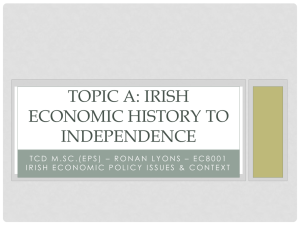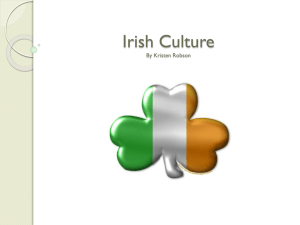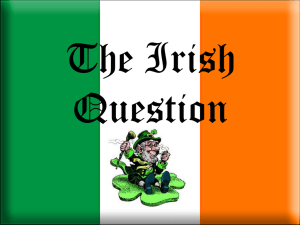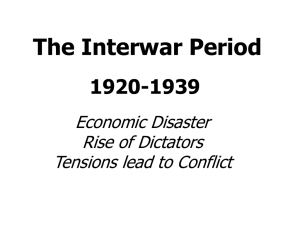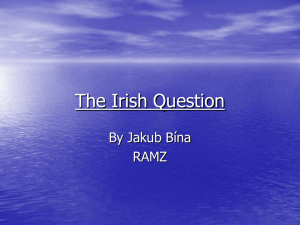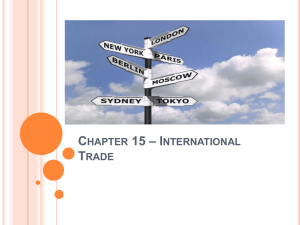File
advertisement
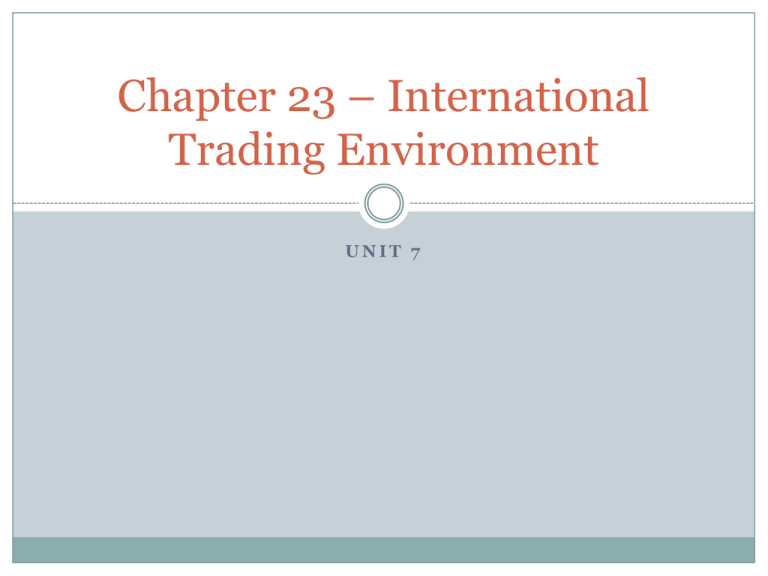
Chapter 23 – International Trading Environment UNIT 7 What we’ll be covering International Trade Exports and Imports Balance of Trade/Payments Why Countries Import Why Countries Export Significance of International Trade Free Trade and Protectionism Barriers to Trade Changes in International Economy Ireland’s Opportunities in Developed and Developing Markets Ireland’s Challenges in Developed and Developing Markets Role of ICT in International Trade Government help for Irish Exporters International Trade Firms buying and selling goods and services across national boundaries The level of world trade has grown rapidly in recent decades and has brought increased wealth to many countries Exports and Imports This involves trading between different countries e.g. Dunnes Stores imports fruit from South Africa Waterford Crystal exports glassware to USA Visible Exports Ireland sells products to foreign countries. Dell sells computers to Middle East. Invisible Exports Ireland sells services to foreign countries. British tourists stay in a Dublin hotel. Visible Imports Ireland buys products from foreign countries. Dunnes Stores buys fruit from South Africa. Invisible Imports Ireland buys services from foreign countries. Irish family stays in a hotel in Paris. Balance of Trade/Payments The Balance of Trade/Payments measures how successful a country is at international trade. Balance of Trade = Visible Exports - Visible Imports Balance of Payments = Total Exports - Total Imports Why Countries Import 1. Lack of Natural Resources A country may not have resources it needs. Ireland does not have enough oil and must import from Saudi Arabia. 2. Unsuitable Climate A country may not have correct weather to grow certain crops. Ireland imports coffee and bananas to combat this. 3. Lack of Skills Some countries are highly skilled at making certain products. Ireland imports Swiss watches as they are such a high standard. 4. Bigger Choice for Consumers This gives consumers more of a choice about what they buy. Ireland still buys potatoes from other countries to give more choices. Why Countries Export 1. Survival To make money businesses may need to export to bigger countries. Irish aircraft manufacturer can only survive if it exports. 2. Increase Sales and Profits Business will sell to foreign countries to increase sales and profits. U2 sell their CDs all over the world. 3. Diversification This spreads the risk of a business failing by selling to other countries so that if one economy fails the other countries can keep the company going. Even though Ireland is in a downturn, Bailey’s sales abroad can keep the company in profit. Significance of International Trade 1. 2. 3. 4. 5. Allows businesses to sell to billions of customers worldwide. Gives economies of scale to businesses. Allows Irish businesses to receive foreign currency which can be used for importing. Increased sales cause businesses to hire more employees which decreases unemployment and provides government with more money from tax. Irish businesses face competition from foreign firms which forces them to keeps costs low. Ryanair keeps costs low to compete with foreign airlines. Free Trade and Protectionism Free Trade means that countries can buy and sell with each other without any barriers or restrictions. All the countries in the EU practise this. Protectionism means that countries try to stop foreign imports with barriers to trade. Barriers to Trade 1. Tariff A tariff is a tax that a country adds to the price of foreign imports 2. Quota A country puts a limit on the amount of foreign imports it will allow. 3. Embargo This is a complete ban on all foreign imports (or imports from specific country) into the country. The USA has a trade embargo with Cuba 4. Subsidy This is money that a government gives to its own domestic businesses to allow them to sell more cheaply. Changes in International Economy 1. Globalisation This is an increasing number of global businesses, which operate throughout the world. Examples include Coca-Cola, McDonalds Their businesses sell the same product all over the world but make their products in various locations. This provides opportunities for Irish businesses as these global businesses buy their materials from Irish ones if they set up here. However, they can also be a threat to Irish businesses with extra competition that could wipe them out. Changes in International Economy 2. Improved Information and Communications Technology Many businesses use internet for international trade and can sell their products online without having to set up shops. This means the smallest Irish businesses can engage in international trade. Changes in International Economy 3. Increasing Number of Trading Blocs These are groups of countries that agree to freely buy and sell to each other without any barriers to trade. However, they may impose tariffs on imports coming from non-member countries. An example is the North American Free Trade Agreement (NAFTA) which consists of Canada, the USA and Mexico. Another example is the EU, the largest trading bloc in the world which gives Ireland access to over 500 million people. Changes in International Economy 4. Deregulation of International Trade This is the process of removing all the barriers to trade that prevent free trade between countries. The World Trade Organisation (WTO) consists of over 150 countries which holds negotiations between countries to try to remove barriers to trade and to sort out other trade problems. This presents Irish businesses with opportunities to increase their sales. It is also a threat, however, as more competition exists with fewer restrictions. Changes in International Economy 5. New Markets Former communist countries are now starting to grow, develop and are importing and exporting a lot more which provides opportunities to Irish businesses. Ireland now faces competition from low wage economies such as the Philippines. A major new market is China which has the largest population on the planet. The government their recently has allowed international trade. This provides opportunities to Irish businesses but also creates threats to Irish manufacturers. Ireland’s Opportunities in Developed and Developing Markets 1. Increased Sales Irish membership of EU allows Irish businesses to sell to more people. The WTO has also removed many worldwide trade barriers which allowed more freer international commerce. 2. Lower Costs Economies of scale is caused due to Irish exporters needing to make more products. 3. Diversification Allows Irish businesses to spread their risk by selling elsewhere. 4. Earn Foreign Currency Irish businesses receive foreign currency when exporting which can be used to pay for imports. A yoghurt manufacturer in Ireland can export to USA and use the dollars received to buy fruit from Florida. Ireland’s Opportunities in Developed and Developing Markets 5. Overcome Trade Barriers Irish businesses can set up branches in other countries to overcome barriers to trade. If an Irish manufacturer sets up a plant in Mexico, all products there can be freely sold to the USA and Canada as they are all NAFTA members. 6. English As English is the international language of business, Irish people can converse with other businesses worldwide. 7. Educated Workers As we have a well-educated workforce we have opportunities to invent new products to export all over the world. Our biggest ‘knowledge based’ exports are medicines and computers 8. Green Image Ireland has a good image around the world as a clean and green country which makes it easier to sell to other countries and attract foreign tourists which brings in billions of euro. Ireland’s Challenges in Developed and Developing Markets 1. Foreign Languages Many foreign customers deal in their own language which poses communication problems which leads to brand names, websites and other things being changed which costs time and money. KFC accidently translated its slogan “finger-lickin’ good” into “eat your fingers off” in Chinese 2. Exchange Rate Changes If the euro increases in value foreigners will buy less and our exports will fall. If the euro decreases then the price of foreign materials increases and so this increases the costs of Irish businesses. Ireland’s Challenges to Developed and Developing Markets 3. Distribution Problems Ireland is only one of 3 EU countries without a land link to other EU countries. This makes it more difficult to transport goods. Goods can only be sent by plane or ship and must adhere to timetables and weather whereas other countries can just load their goods into a lorry. 4. Cultural Differences Up until recently we were homogenous (white and catholic) and it is therefore a challenge to learn cultural norms of trading partners. Revlon tried to launch a camellia flower perfume in Brazil without realising that they are funeral flowers over there. Ireland’s Challenges to Developed and Developing Markets 5. Competition from Low-Wage Economies Almost impossible for Irish manufacturers to compete with countries with very low wages as they are much cheaper. Irish businesses must develop products that low wage countries don’t have the skills to make. 6. Payment Problems If a foreign customer does not pay, there may be little the Irish business can do to recoup its money due to different legal systems. Role of ICT in International Trade 1. Increased Sales Internet allows businesses to engage in e-commerce where businesses can advertise and sell their products online. Sites such as EBAY allow small businesses to sell products online too. 2. Advertising Businesses can use websites such as MSN or Yahoo to advertise their products which can be used to reach millions of people. 3. Faster and Cheaper Communications Email allows businesses to send messages quickly and cheaply. Role of ICT in International Trade 4. Decision-Making The internet has information on millions of topics which enables business people to make better informed decisions when it comes to foreign markets. 5. Reduced costs Video-conferencing makes international trade easier as CEO does not have to travel overseas for meetings which helps time and costs. Government help for Irish Exporters Enterprise Ireland Provides market research on business opportunities in foreign countries. Gives low cost loans to Irish businesses to help export. Gives them grants to help export. Trains them in exporting. Gives them advice on everything to do with foreign trade. Currently running a campaign in UK to get Britain to use Irish building firms and materials for 2012 Olympic Games. Government help for Irish Exporters Department of Enterprise, Trade and Employment Gives advice on documents used in foreign trade and regulations. Provides Export Credit Insurance which promises to pay exporter if foreign customers don’t Diplomatic Services Lobbies foreign government and companies to trade with Ireland. When mad cow disease broke out, many countries banned Irish Beef but diplomats explained that Ireland was not affected. Help to organise trade missions where Irish businesses go abroad to make foreign contacts. Largest ever trade mission to China was led by May McAleese in 2003 where they won business contracts worth over €40 million Helps to organise trade fairs where Ireland puts on exhibitions of its products in a foreign country.

![South east presentation resources [pdf, 7.8MB]](http://s2.studylib.net/store/data/005225551_1-572ef1fc8a3b867845768d2e9683ea31-300x300.png)
